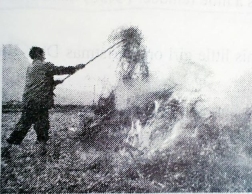题目内容
World leaders from nearly 200 countries have signed an important historic agreement to fight global climate change. The agreement came after two weeks of talks between the leaders at the 21st Conference in Paris, France.
As part of the Paris agreement, countries said they would cut down on pollution However, according to the terms of the deal, countries that don’t do this will not be punished, or fined. Instead,the document is meant to show that governments around the world take climate change seriously and are willing to work together to fight global warming.
World leaders have met many times to discuss climate change. But, the 21st Conference of Parties, or COP21, which began on November 30 in Paris, was the first time they agreed on a global, legal pact (协定).
Before the conference, each nation was asked to create plans on how to reach the shared goal. The pact that was signed allows countries to decide the best way to cut down their gas pollution. No matter how they decide to go green, each country must report honestly on all of their efforts. Every five years, nations must look at the work they’ve done and submit new plans on how they will improve over the next five years.
In the pact, the countries pledge(承诺)to limit the amount of greenhouse gases emitted(排放) by human activity to the levels that trees,soil and oceans can absorb naturally. It urges countries to spend trillions of dollars on creating new energy sources, like solar and wind power. It also requires countries to raise at least $ 100 billion each year to help developing countries.
However, critics of the pact say it is not detailed enough, and doesn’t include specifics about how the plan will be enforced and how improvements will be measured. The pact does include one large, specific goal: how countries will aim to keep global temperatures from rising more than 3. 60℉(20℃) by 2100.
Nonetheless,the agreement is considered by many world leaders to be a major victory. The U. N. has been working more than two decades to convince governments to work together to reduce man-made emissions.
“History will remember this day,” U. N. Secretary General Ban Ki-moon said. “The Paris agreement on climate change is a monumental success for the planet and its people.”
1.When was the legal pact probably passed?
A. On November 30. B. On December 4.
C. On December 8. D. On December 12.
2.According to the agreement, countries_________ .
A. have to give a yearly report about their work
B. will be published if they fail to reduce pollution
C. are required to ensure investment in fighting pollution
D. should try to reach the agreed standard in five years
3.What is each country required to do before the Paris conference?
A. Provide a work plan. B. Give an oral explanation.
C. Provide a large amount of money. D. Give a written assessment.
4.The pact is thought to be imperfect because_______.
A. it doesn’t consider developing countries
B. it is not detailed enough
C. it is not attractive to all countries
D. it only benefits some countries
 浙大优学小学年级衔接捷径浙江大学出版社系列答案
浙大优学小学年级衔接捷径浙江大学出版社系列答案


